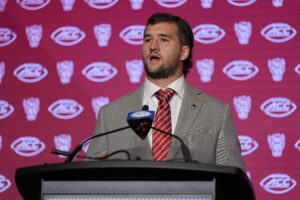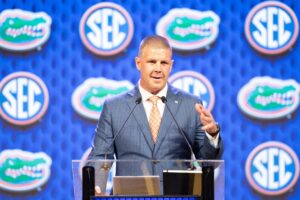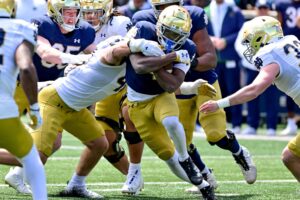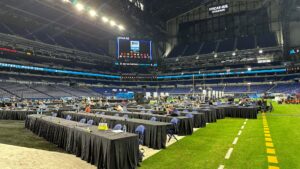The Pac 12 is the latest conference to reverse its earlier decision and return to play football this Fall. After a week-long delay for further consideration, the conference made the announcement Thursday. They will play an seven game schedule beginning on November 6th-7th than concludes with the championship game on December 18th, one day before the playoff announcements. It has not been easy but the Pac 12 returns to football now. Each team will play five games within its division, and then one cross over game. All teams will also play a cross over game on championship weekend so that every one has seven games. There will be no fans at the games until further notice.
Pac 12 Returns To Football
Sources confirm that many of the schools were ready to make the announcement last Saturday. That would have allowed for an October 31st start and another game. Unconfirmed media reports say that UCLA Chancellor Gene Block was among those needing another week to consider options. It is also known that Stanford was not convinced of the viability of playing, as of last week’s meetings.
Oregon president Michael Schill said part of the reason for the delay was the desire to go back to the schools, students, and faculties to enlarge the scope of conversation.
Commissioner Larry Scott said there were, “Robust models” looking at playing as early as October 31st. They were not accepted because the conference wanted to, “Move forward as one.”
Schill also vehemently denied that finances played any role in the decision. The Pac 12 as a conference, the tv network, and many schools are in significant financial hardships. Schill said the topic never came up. “Let me jusr say one thing this was not about. Social media sometimes talks about the conference does things for money. This has nothing to do with money.”
Testing And Accountability
The ability to perform COVID tests every day was a critical element for the return. In early September, Pac 12 commissioner Larry Scott announced a contract with Quidel Labs of San Diego. The agreement would supply all conference schools with the equipment to process rapid results COVID testing on a daily basis. At the time it was said that the equipment would be at the schools around the end of September. Factoring in a few days for training on how to use the equipment, and the self-proclaimed necessary six weeks of training camp, Scott said teams could be up and raining by mid to late November. Still, he admitted to eyeing a post-January 1st, 2021 beginning for football.
This was not the obvious that the Big Ten decision became over the last two or three weeks. The Big Ten had outcry from within its own ranks when it shut down on August 11th. That was the same day the Pac 12 announced it was postponing the Fall football season. At the time they both say they had with an eye on a Spring schedule. Most would quietly agree that was untenable. The Pac 12 fanbases were typically more mollified by the decision to postpone. There was no state by state campaign by fans or programs to play.
Scott was more forthcoming with details that went into the decision to postpone than was his Big Ten counterpart. On the media call in which he discussed the “postponement,” Scott had member school administrators and doctors available to answer questions. That was enough to allay any concerns from a generally more complacent fan base.
California and Oregon
Part of Scott’s original rationale started to unravel last week though. He had long said schools in LA County, the Bay Area, and Oregon had no clearance from their regional health director to resume any full-team football activities. There was a also a well-routed claim from others that the waivers given for the Rams, Chargers, and 49ers was based on the ability to test for the COVID virus every day. A source inside California Governor Gavin Newsom’s office told us that simply was not true. That source said the waivers from the state were granted on the commitment to daily testing. There is no one actually asking for weekly verification that the NFL teams are testing daily.
Oregon Governor Kate Brown had already said in August, she would grant a waiver for her schools, (Oregon and Oregon State). She made it clear, she did not want them being at a competitive disadvantage if other teams were playing.
Then, earlier this week, Newsom issued a blunt refute of Scott’s regular claims about the health departments. “When we put our guidelines a month or so ago, and we aligned them, we worked with the NCAA and we aligned them with the NCAA, there’s nothing in the state guidelines that denies the PAC 12 from having conference games. There’s nothing in our guidelines the state put out that denies these games from occurring.” A deeper dive into the guidelines from the governor’s office revealed that they limited the number of people on a practice at one time to 10. Considering the number of players on a side, or the need to have scrimmages, the state plan failed. Newsom immediately vowed to alter it as needed by week’s end.
Since the waivers were being granted on the commitment to the testing, the Pac 12 likely could have been given them a two-three weeks ago. Knowing the equipment from Quidel Labs was on its way could have been a selling point in the request.
Scott said there are still local issues that will guide when each team can start practice. He said the six week ramp up was critical to choosing the start date.
In a prepared statement issued before the formal announcement, UCLA athletic Director Martin Jarmond said, “We’ve heard the voices of our student-athletes and are grateful for the leadership and guidance of the Pac-12 Covid-19 Medical Advisory Committee, which has methodically and thoughtfully helped navigate a path forward with daily, rapid testing on the horizon.”
Revenues and Costs
There is also the issue of money. No one will openly admit it, but surely finances have played a role in all the decisions, across the country. Schools had to assess what the NCAA mandated insurance indemnities, plus the testing protocols would cost. That would get weighed against the loss of tens of millions in TV revenue, and potential gameday revenue. It was not easy for Big Ten or Pac 12 schools to sit for the last two weeks as teams from other P5 conferences were on in prime time on Saturdays, no matter how chaotic the weekly scheduling is.






